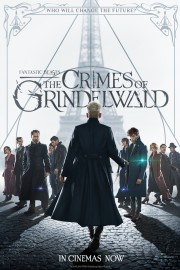Fantastic Beasts: The Crimes of Grindelwald
One of the first things that popped into my head as I watched “Fantastic Beasts: The Crimes of Grindelwald” was that, while the stability of having director David Yates direct the final four “Harry Potter” films was a tremendous boon to that series, the first two “Fantastic Beasts” films show that maybe, his continued efforts in the director’s chair of this franchise have, perhaps, run their course. The visual palette he has brought to J.K. Rowling’s Wizarding World has run its course, and, if we do get more films in this franchise, I would like to see someone else come in to bring a fresh perspective to the world.
When “Fantastic Beasts and Where to Find Them” came out in 2016, I was hesitant about what the film was in terms of not just how it told its story, but the type of story it told. But overall, I thought it was successful, and I liked that it was a different type of hero’s journey from the archetypal “Chosen One” arc of Harry Potter. With “The Crimes of Grindelwald,” more of the flaws in not just Rowling as a screenwriter, along with the inherent problems with doing a prequel, rear their head, and the film feels more like fan service than a worthy entry in one of the biggest franchises in modern film history. I’m not sure how excited I can get for a third film after this.
The film’s subtitle, as well as the opening scene, make us think that the crux of the story will revolve around Grindelwald, the villain unmasked by Newt Scamander (Eddie Redmayne) in the previous film, and here by played Johnny Depp, and while yes, the actions of Grindelwald, a powerful dark wizard who is trying to bring followers to his cause, and fulfill a prophecy that would lead to wizards taking control of the world, are of utmost importance to the narrative, the story Rowling has told goes in a number of different directions, including further dealing with romances set up in the last film between Newt, Jacob Kowalski (Dan Fogler) and witch sisters Tina and Queenie Goldstein (Katherine Waterston and Alison Sudol), respectively, and the fallout Newt has with the Ministry of Magic from his exploits in New York. But Grindelwald’s plan also hinges on the attempts by a young man of magical talents, Credence Barebone (Ezra Miller), to discover the truth of who he is, and the implications that this quest has for the wizarding world.
While there’s little question of Rowling being a great literary author, “Grindelwald” exposes her as an average screenwriter. As with the director’s chair, I think fresh blood brought into the process, working to massage Rowling’s narrative into a successful screenplay, would be a good step in helping to right the ship with the “Fantastic Beasts” films. Rowling has some interesting storytelling threads, and an underrated protagonist in Newt Scamander, but this film feels as though it doesn’t have a sure-footed storytelling path it wants to follow in getting from the beginning, where Grindelwald escapes, to the ending, and what that means for the rest of the story as it continues. Another issue it has is an issue that plagued both “Star Wars” and the “Hobbit” movies- the need to tie a bow around every element of the story to connect it was the existing series of films. There are a LOT of character names brought in that you will recognize, whether it’s a full name like Nicolas Flamel or Minerva McGonagall or just a surname like Lestrange. That family plays a big role in the narrative of this film in the form of Leta (Zoe Kravitz), and it’s some of the most interesting material in the film, and the character is well played by Kravitz, which makes the seemingly-convoluted storytelling feel all the more frustrating. Another character you will recognize, in name, is Albus Dumbledore, and he is played by Jude Law here in a wonderful performance that pays tribute to the character’s previous actor, Michael Gambon, and how he brought him to life in six other films. Again, though, it all feels like fan service- while she starts connecting the dots by the end, we’re left wondering how much they make sense, and I’m not sure if I am excited about seeing this all pay off.
There’s a lot to like about this film- the visual effects and production design are as good as ever; the score by James Newton Howard is another in a strong run of scores for this franchise; the performances are good (even Depp’s Goth wizard Grindelwald doesn’t grate like you might expect it to); and there are really interesting story threads here, as I’ve mentioned before. As a whole, though, I was left wondering not only whether Rowling and Yates were just spinning their wheels with this effort, and that maybe, finally, Rowling had bit off more than she could chew as a storyteller. We’ll see where the series goes from here.










